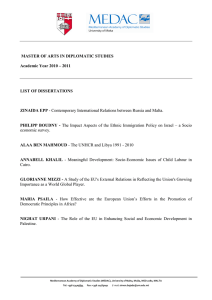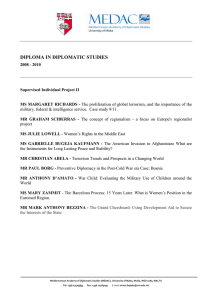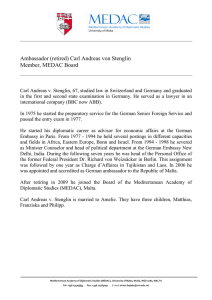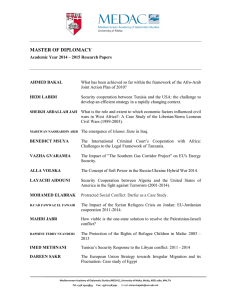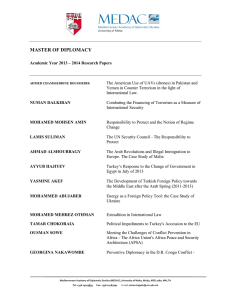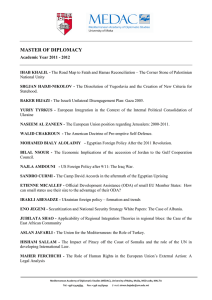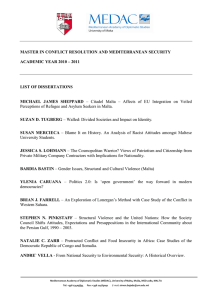Studying at the Academy of Diplomatic Studies in Malta
advertisement
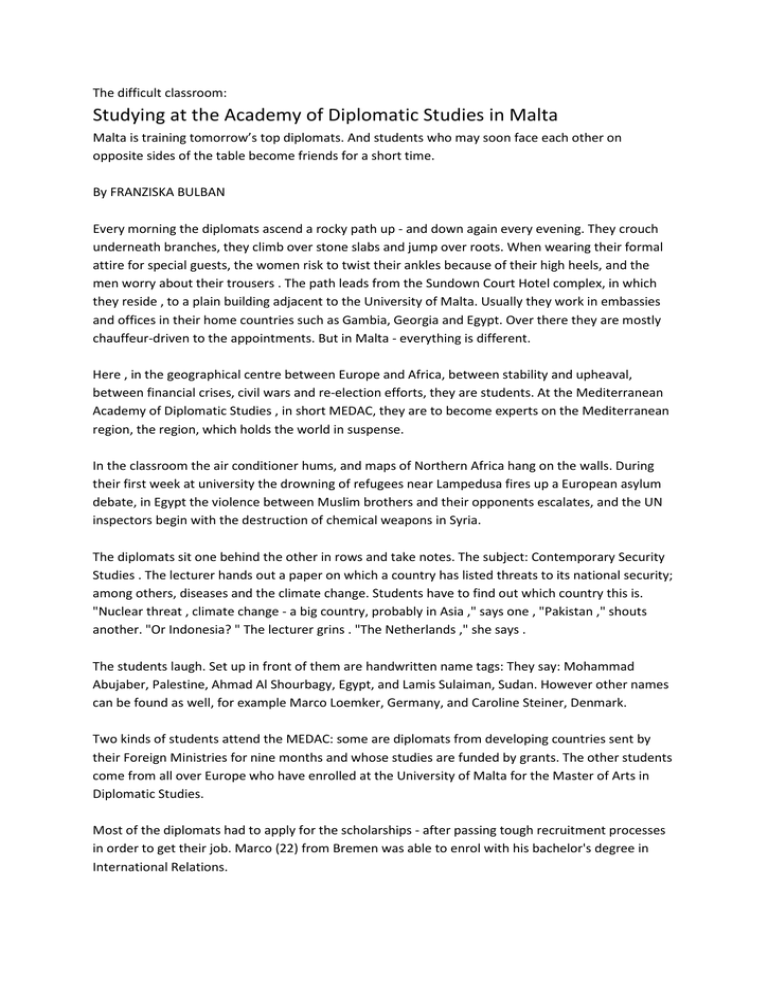
The difficult classroom: Studying at the Academy of Diplomatic Studies in Malta Malta is training tomorrow’s top diplomats. And students who may soon face each other on opposite sides of the table become friends for a short time. By FRANZISKA BULBAN Every morning the diplomats ascend a rocky path up - and down again every evening. They crouch underneath branches, they climb over stone slabs and jump over roots. When wearing their formal attire for special guests, the women risk to twist their ankles because of their high heels, and the men worry about their trousers . The path leads from the Sundown Court Hotel complex, in which they reside , to a plain building adjacent to the University of Malta. Usually they work in embassies and offices in their home countries such as Gambia, Georgia and Egypt. Over there they are mostly chauffeur-driven to the appointments. But in Malta - everything is different. Here , in the geographical centre between Europe and Africa, between stability and upheaval, between financial crises, civil wars and re-election efforts, they are students. At the Mediterranean Academy of Diplomatic Studies , in short MEDAC, they are to become experts on the Mediterranean region, the region, which holds the world in suspense. In the classroom the air conditioner hums, and maps of Northern Africa hang on the walls. During their first week at university the drowning of refugees near Lampedusa fires up a European asylum debate, in Egypt the violence between Muslim brothers and their opponents escalates, and the UN inspectors begin with the destruction of chemical weapons in Syria. The diplomats sit one behind the other in rows and take notes. The subject: Contemporary Security Studies . The lecturer hands out a paper on which a country has listed threats to its national security; among others, diseases and the climate change. Students have to find out which country this is. "Nuclear threat , climate change - a big country, probably in Asia ," says one , "Pakistan ," shouts another. "Or Indonesia? " The lecturer grins . "The Netherlands ," she says . The students laugh. Set up in front of them are handwritten name tags: They say: Mohammad Abujaber, Palestine, Ahmad Al Shourbagy, Egypt, and Lamis Sulaiman, Sudan. However other names can be found as well, for example Marco Loemker, Germany, and Caroline Steiner, Denmark. Two kinds of students attend the MEDAC: some are diplomats from developing countries sent by their Foreign Ministries for nine months and whose studies are funded by grants. The other students come from all over Europe who have enrolled at the University of Malta for the Master of Arts in Diplomatic Studies. Most of the diplomats had to apply for the scholarships - after passing tough recruitment processes in order to get their job. Marco (22) from Bremen was able to enrol with his bachelor's degree in International Relations. " It's probably not quite as exciting for the diplomats to share the classroom with me as it is for me to sit there with them," says Marco and shrugs. He was still young when he realised that he likes an international environment . " Back in Germany I was not a top student," he says, " I had trouble with the teachers, I felt misunderstood and was bored. " When his older sister went abroad, he decided to take his life in his own hand. That was when Marco was 13. He opted for a boarding school in England. Strict rules , getting up early, hardly ever being permitted to go out; but on the other hand having classmates from all over the world - Marco was happy. After school he travelled around half the world, he visited school friends in Kuwait, he sailed through the Aegean with Turkish friends and he spent time in the South African Swaziland with the royal family. Foreign cultures, to understand how other people tick, that is what fascinated him. Diplomat, perhaps even ambassador, this sounded to be a dream job to Marco. However sometimes he has his doubts. Do I really want to spend all my life moving around? May be one day I will long for a home, a place to come back to? Marco has not decided yet. He has one year to think about it, to talk to the diplomats in his classroom, to get a clear idea about his wishes. And yes, his studies are to be brought to a close as well. Even if the semester has just begun there is already a decent amount of work. So Marco spends this Saturday in his apartment in the west of Malta and prepares a presentation, although the late summer sun is shining and the last tourists are walking along the beach. "An infinite amount of reading material," he says, pointing to his coffee table. The MEDAC is known as a tough school. On this first weekend the diplomats also have to deal with mundane problems. Ahmad from Egypt, for example, is 33, he has a wife and two children - and for the first time in his life, he has to wash his laundry. Lamis, 24, is from Sudan, she works for the Arab League in Cairo and now has to buy food herself. Does the word "hamburger" mean that there is pork meat in it? Lamis hesitates, puts the meat back in the freezer, wanders through the shops. Back home her parents take care of these things. And instead of walking 20 minutes from the hotel to the supermarket, back in Cairo she would take her dark blue BMW. It is part of the role change - jeans instead of a suit, bus instead of the car, student instead of a diplomat. But this role change helps in the classroom, because at the MEDAC everyone is supposed to act as a private individual and to express their own opinions. But in their professional role, diplomats are always representatives of their countries, and they have to represent them in particular in public. That is one of the reasons why the diplomats here do not want to give the wrong impression, and why many react reserved to a visit by a German reporter, and why some do not even want to be photographed. At the end of the year they have to return to their official role and to fullfil the accompanying expectations. The situation becomes especially challenging when discussing controversial topics, such as when diplomats from Algeria and Morocco meet and discuss the border between their countries. Or when it comes to Israel. Topics, about which most Europeans hear only in the news, have here a direct influence on the people's lives in this classroom. When the Arab Spring broke out, many diplomats attending the MEDAC worried about their families, their home and their friends . " It is my job to redirect the strong feelings," says institute director Stephen Calleya , 49, and folds his manicured hands, " to use them as a motivator to deal academically with a topic." He has been working at the MEDAC since 1995. All his office is decorated with photos. Most of these show Calleya shaking someone's hand: a German ambassador, an Egyptian presidential candidate. The network of MEDAC, this is his great pride. " It is one of the most important elements of this training," says Calleya , "contacts that sometimes last a lifetime. " Whether Marco Loemker will join the Foreign Office, or whether the diplomats will meet again one day as ambassadors or negotiators: They will remember each other as people in jeans and t-shirt and will remember to have walked part of the way together. Even if it was a bumpy path, ducking under branches and jumping over roots.
